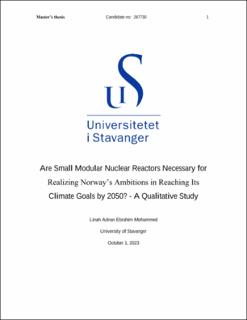Are Small Modular Nuclear Reactors Necessary for Realizing Norway’s Ambitions in Reaching Its Climate Goals by 2050? - A Qualitative Study
Master thesis
Permanent lenke
https://hdl.handle.net/11250/3116020Utgivelsesdato
2023Metadata
Vis full innførselSamlinger
- Studentoppgaver (SV-IMS) [1384]
Sammendrag
Today, the world is witnessing many environmental challenges related to global warming, pollution resulting from carbon emissions, etc., which force many countries to change their consumer and economic policies, especially energy production policies. To face these challenges, most first-world countries, including Norway, have made many pledges and developed many plans in order to reach the desired environmental goals. Here SMR (Small Modular Reactor) technology appears as a promising and sustainable solution derived from nuclear energy technology that is considered one of the proven and well-known solutions for producing clean energy but simultaneously capable of resolving issues related to nuclear energy such as safety and waste management. Anyway, this technology still suffers from rejection at the global level and in Norway, mainly due to the questionable stereotype associated with nuclear energy technology, and the future of SMR depends on the amount of political and societal support to overcome these obstacles. Therefore, this thesis provides an in-depth study of the future of SMR by clarifying the global trend and the stresses it applies to the Norwegian energy system and analyzes the position of the socio-technical system with regard to integrating this technology into the energy mix based on the classic qualitative research method and guided by The Multi-Level Perspective (MLP) framework. Today, the world is witnessing many environmental challenges related to global warming, pollution resulting from carbon emissions, etc., which force many countries to change their consumer and economic policies, especially energy production policies. To face these challenges, most first-world countries, including Norway, have made many pledges and developed many plans in order to reach the desired environmental goals. Here SMR (Small Modular Reactor) technology appears as a promising and sustainable solution derived from nuclear energy technology that is considered one of the proven and well-known solutions for producing clean energy but simultaneously capable of resolving issues related to nuclear energy such as safety and waste management. Anyway, this technology still suffers from rejection at the global level and in Norway, mainly due to the questionable stereotype associated with nuclear energy technology, and the future of SMR depends on the amount of political and societal support to overcome these obstacles. Therefore, this thesis provides an in-depth study of the future of SMR by clarifying the global trend and the stresses it applies to the Norwegian energy system and analyzes the position of the socio-technical system with regard to integrating this technology into the energy mix based on the classic qualitative research method and guided by The Multi-Level Perspective (MLP) framework.
